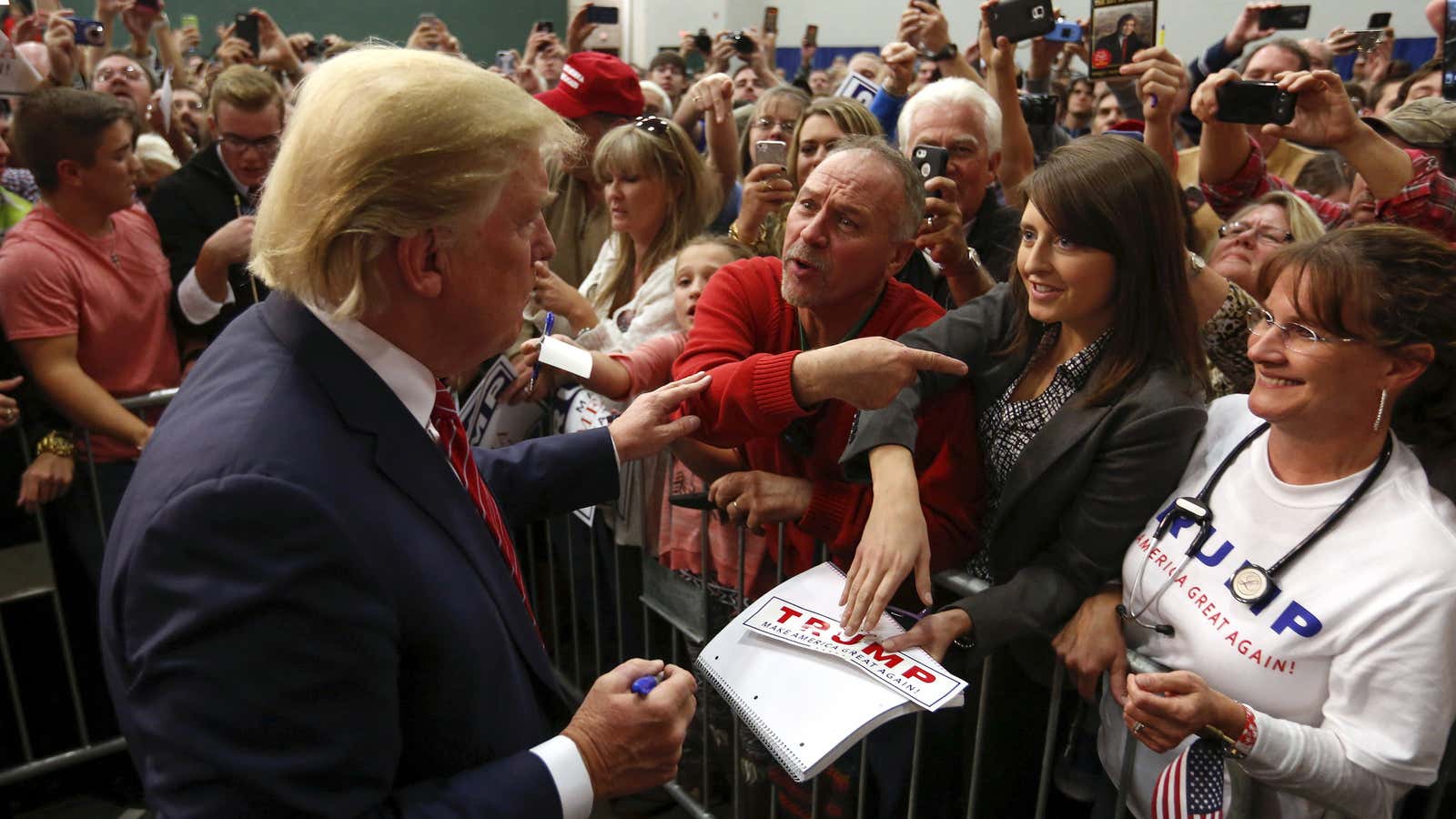He has a commanding lead in the polls, but Donald Trump is the only Republican presidential candidate who hasn’t purchased a database of voter information, which political campaigns use to target supporters and mobilize them on election day.
Modern campaigns also rely on voter files to plan everything from advertising to events, and accurate information is particularly key in the early state of Iowa, where voters will select a candidate in January through a complicated caucus process that gathers individuals in a room to make a group decision. Meticulous organization is seen as the key to victory.
But Trump’s campaign hadn’t purchased any voter information as of the end of September, according to financial disclosures analyzed by Quartz, and his campaign confirms that he is not using the national Republican party’s voter file.
Voter databases are created from the electoral rolls of registered voters in a given county, but those records quickly become outdated as people move or pass away. They also don’t reflect which registered voters actually vote on a regular basis. Campaigns constantly update this information by canvassing neighborhoods and calling voters, then share it with national party organizations or private companies who attempt the keep the information as current and usable as possible.
Political operatives from both parties said they didn’t know how Trump would turn out his supporters without a voter file.
“The voter file is a foundational piece for any grassroots campaign in Iowa and New Hampshire,” Patrick Ruffini, a veteran GOP operative who founded digital agency Engage, told Quartz. “If Trump’s campaign were not using any voter file, even after being offered it by the RNC, that would be a pretty shocking statement.”
This year, the Republican National Committee, which is sharing data with two private firms, the GOP Data Trust and i360, has offered its voter file free-of-charge to all Republican primary candidates. According to Yahoo News, all of the contenders have taken them up on this offer except Trump, whose spokesperson told Quartz today that the campaign has not reached an agreement with the RNC. A committee spokesperson did not respond to requests for comment.
On the Democratic side, the two leading candidates—former secretary of state Hillary Clinton and senator Bernie Sanders—have purchased voter information from the Iowa and New Hampshire state Democratic parties, the two states with the earliest primary elections. Both campaigns also have contracts with NGP VAN, a firm that maintains voter databases for Democratic campaigns.
Trump’s campaign says it has 10 staffers on the ground in Iowa and seven working in New Hampshire, but it isn’t clear how they are organizing their effort. While some aspects of Trump’s untraditional campaign—like running without a pollster or media consultants—speak to his unvarnished message and outsider appeal, a failure to do the basic blocking and tackling of finding voters may be a problem.
“Flouting the rules and doing things the unconventional way has been Trump’s trademark so far in the campaign, but eventually this catches up to you,” Ruffini said. “Just think back to Newt Gingrich (and every other candidate save for Mitt Romney and Ron Paul) failing to qualify for the ballot in Virginia [in the 2012 presidential primary.] Eventually, the nomination battle becomes a state-by-state war for delegates, and that starts with being able to target voters.”
Even if Trump’s lack of a voter file hurts him in Iowa, it may not spell the end of his campaign. Arizona Senator John McCain and former Massachusetts Governor Mitt Romney handily sewed up the GOP nominations in 2008 and 2012, respectively, despite surprising losses in the Iowa caucuses to the one-time Arkansas governor Mike Huckabee and former Pennsylvania senator Rick Santorum, who both deployed a network of well-organized evangelical voters.
Ultimately, no amount of organization can win the nomination for an unpopular candidate—and Trump, voter file or no, has popularity to spare.
